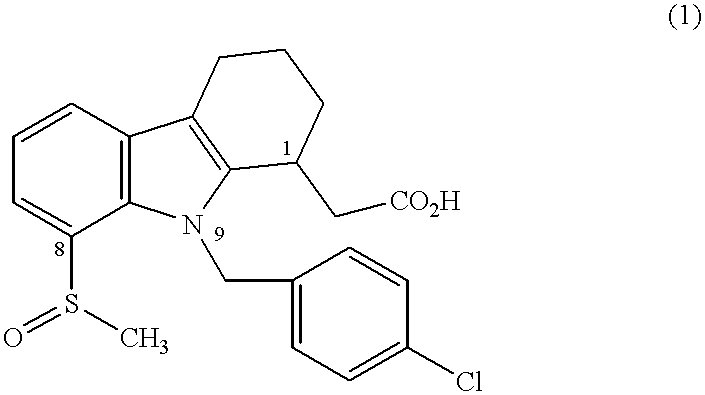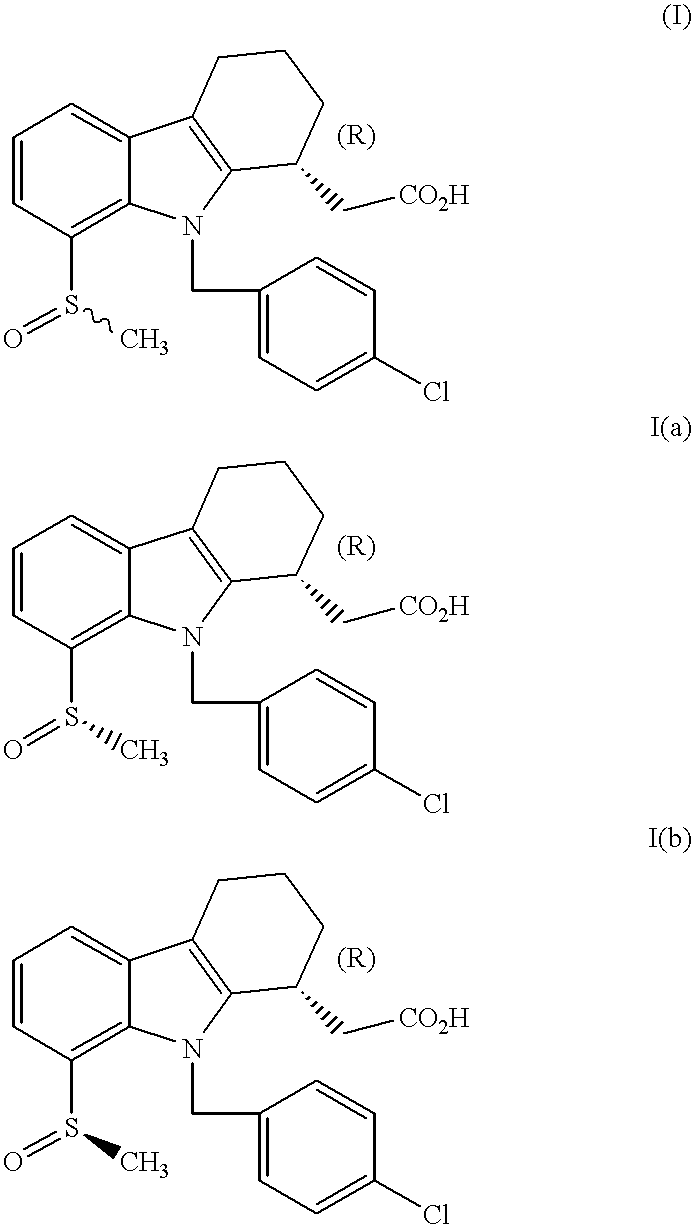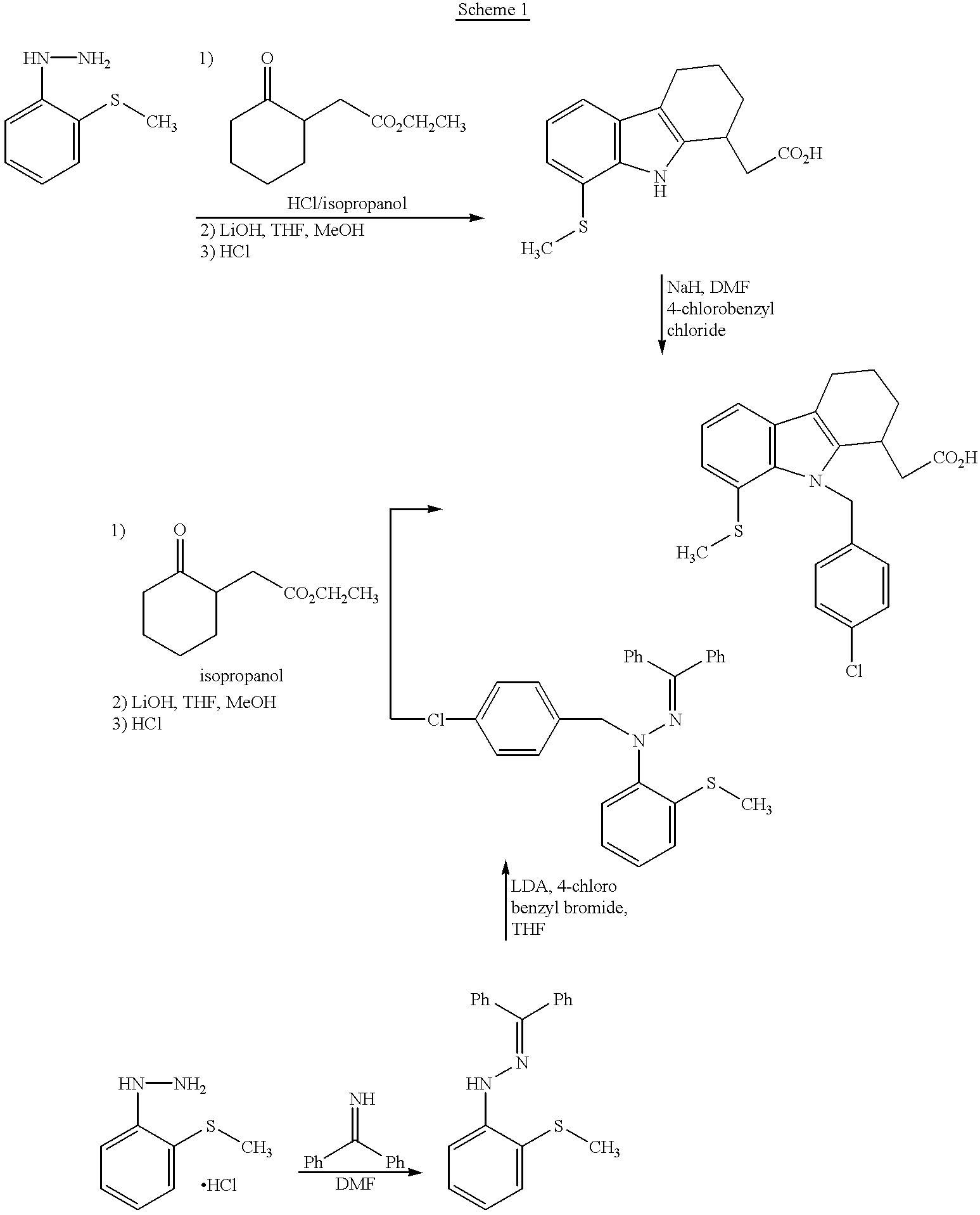Prostaglandin D2 receptor antagonists
- Summary
- Abstract
- Description
- Claims
- Application Information
AI Technical Summary
Benefits of technology
Problems solved by technology
Method used
Image
Examples
example 2
[0067] The compound of Example 1, step d may also be prepared as follows:
Step a. diphenylmethanone N-[2-(methylsulfanyl)phenyl]hydrazone
[0068] 1-[2-(Methylsulfanyl)phenyl]hydrazine hydrochloride (30 g, 148 mmol) was dissolved in 300 ml dimethylformamide and benzophenone imine (26.7 g, 148 mmol) was added dropwise over 5 min. The mixture was stirred for 1 hour and 300 ml ether and 300 mL of water were added. The layers were separated and the organic layer washed twice with brine. The organic layer was dried with sodium sulfate and the solvent removed. The residue with triturated with hexane to obtain 38.5 g of title compound (containing 18 % benzophenone).
[0069] .sup.1H NMR (400 MHz), DMSO, .delta.: 2.60 (s, 3H); 6.80 (t, 1H); 7.30-7.45 (m, 7H); 7.55 (d, 2H); 7.60 (t, 2H); 7.65 (s, 2H); 8.40 (s, 1H).
Step b. diphenylmethanone N-(4-chlorobenzyl)-N-[2-(methylsulfanyl)phenyl]--hydrazone
[0070] Diisopropylamine (29 ml, 206 mmol) was dissolved in 50 ml tetrahydrofuran and cooled to 0.degree...
example 3
[0074] Alternate oxidation of methyl 2-[(1R)-9-(4-chlorobenzyl)-8-(methyls-ulfanyl)-2,3,4,9-tetrahydro-1H-carbazol-1-yl]acetate (product of step f, Example 1) to provide methyl 2-[(1R)-9-(4-chlorobenzyl)-8-((S)-methylsulf-inyl)-2,3,4,9-tetrahydro-1H-carbazol-1-yl]acetate (Me-Ia) and methyl 2-[(1R)-9-(4-chlorobenzyl)-8-((R)-methylsulfinyl)-2,3,4,9-tetrahydro-1H-c-arbazol-1-yl]acetate (Me-Ib)
[0075] To a CCl.sub.4 solution (5.0 mL) of methyl 2-[(1R)-9-(4-chlorobenzy-l)-8-(methylsulfanyl)-2,3,4,9-tetrahydro-1H-carbazol-1-yl]acetate (40.0 mg, 0.1 mmol) at room temperature was added (-) (3'S, 2R) N-phenylsulfonyl 3,3-dichlorocamphoryl oxaziridine (27.5 mg, 0.08 mmol) and this was allowed to stir at room temperature overnight. At this time, the reaction was concentrated and the residue was purified by flash chromatography eluting with 70% EtOAc / hexane to provide 26.7 mg (86%) of the title sulfoxides in an 12:1 mixture of diastereomers as a clear colorless oil. The major diastereoisomer obt...
example 4
[0076] Radioligand binding assays using membranes from cells that express recombinant prostanoid DP receptor (DP).
[0077] Radioligand binding assays are conducted essentially as previously described (Abramovitz et al., Biochem. Biophys. Acta 1483-2, 285-293, 2000). HEK293(EBNA) cells expressing DP are grown in supplemented DMEM complete medium at 37.degree. C. in a humidified atmosphere of 6% CO.sub.2 in air, and then harvested. Cells are disrupted by nitrogen cavitation at 800 psi for 30 min. on ice in the presence of protease inhibitors (2 mM phenylmethylsulfonylfluoride, 10 .mu.M E-64, 100 .mu.M leupeptin and 0.05 mg / mL pepstatin). Membranes are prepared by differential centrifugation (1000.times.g for 10 min, then 160,000.times.g for 30 min, all at 4.degree. C.). The 160,000.times.g pellets are resuspended in 10 mM HEPES / KOH (pH 7.4) containing 1 mM EDTA at approximately 5-10 mg / mL protein by Dounce homogenization (Dounce A; 10 strokes), frozen in liquid nitrogen and stored at -8...
PUM
| Property | Measurement | Unit |
|---|---|---|
| Volume | aaaaa | aaaaa |
| Mass | aaaaa | aaaaa |
| Mass | aaaaa | aaaaa |
Abstract
Description
Claims
Application Information
 Login to View More
Login to View More - R&D
- Intellectual Property
- Life Sciences
- Materials
- Tech Scout
- Unparalleled Data Quality
- Higher Quality Content
- 60% Fewer Hallucinations
Browse by: Latest US Patents, China's latest patents, Technical Efficacy Thesaurus, Application Domain, Technology Topic, Popular Technical Reports.
© 2025 PatSnap. All rights reserved.Legal|Privacy policy|Modern Slavery Act Transparency Statement|Sitemap|About US| Contact US: help@patsnap.com



